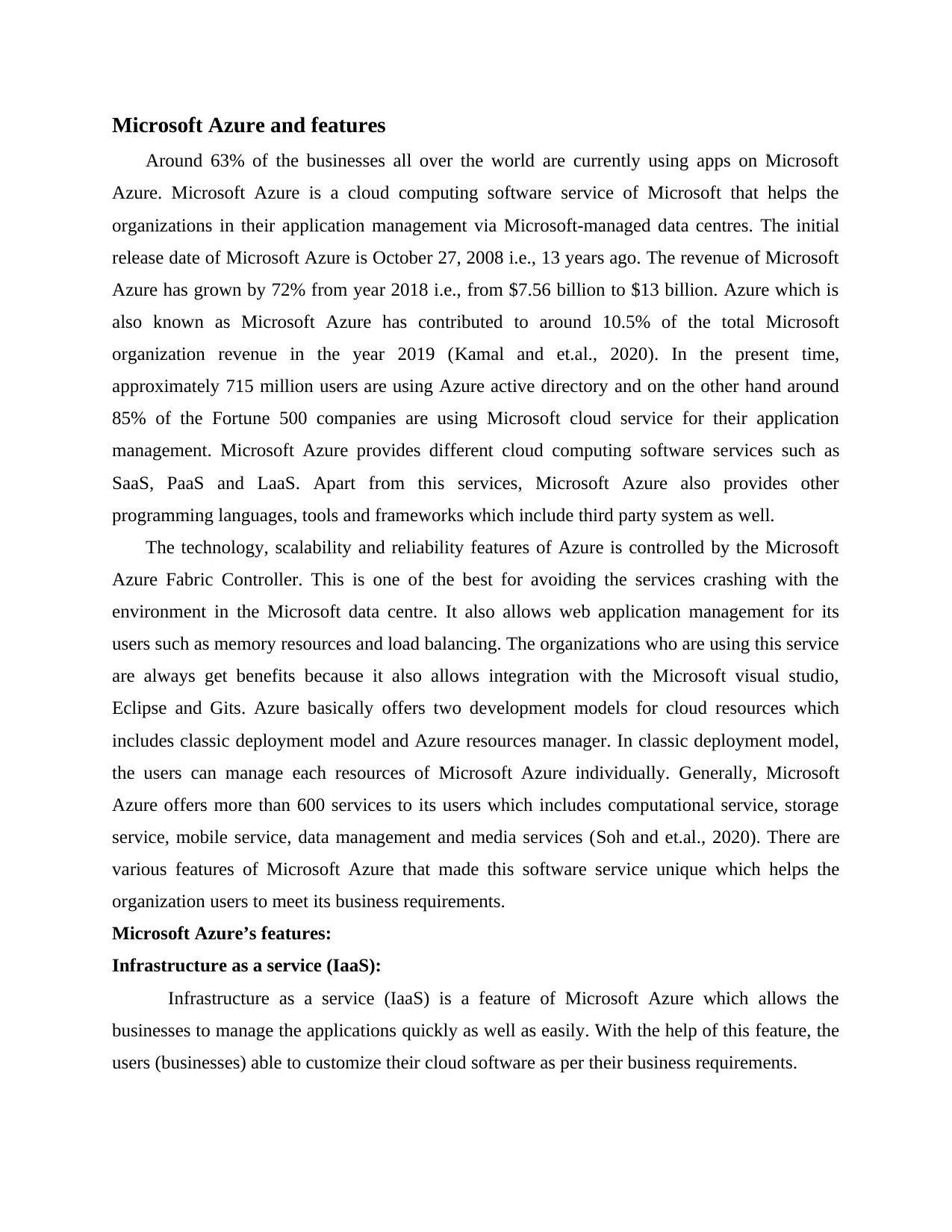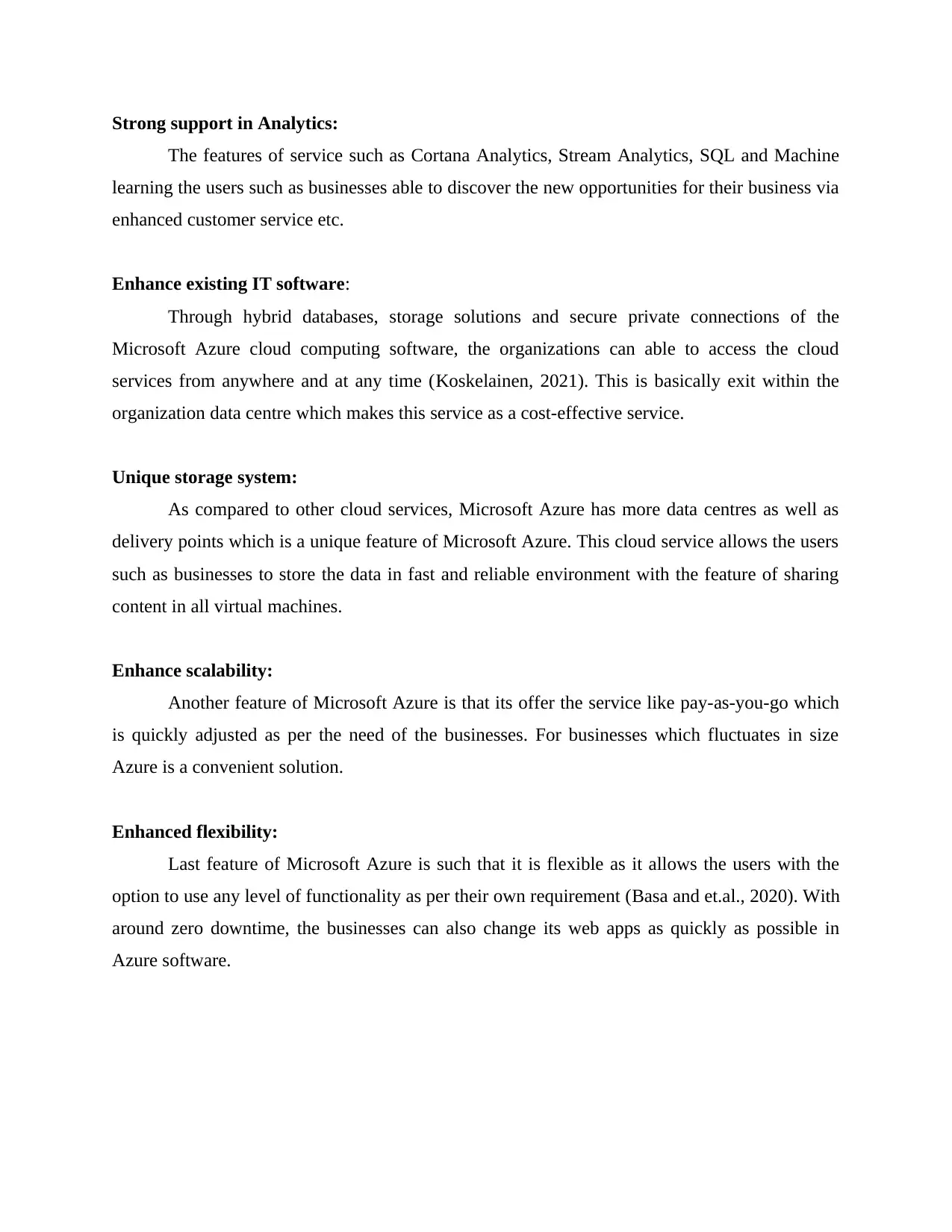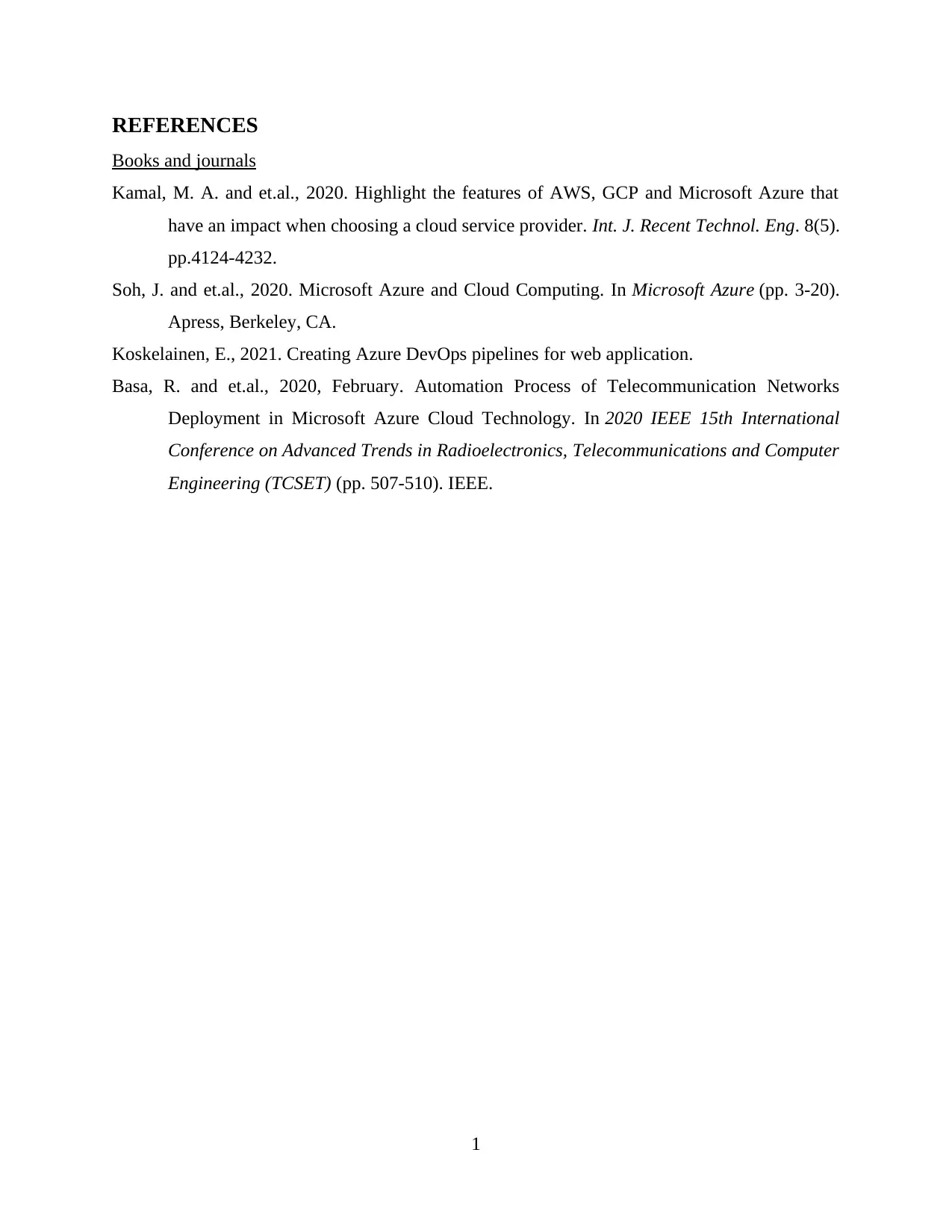A Detailed Report on Microsoft Azure: Features, Services, and Impact
VerifiedAdded on 2023/06/11
|6
|860
|162
Report
AI Summary
This report provides an overview of Microsoft Azure, a cloud computing service by Microsoft, highlighting its features and benefits for organizations. Azure offers various services such as SaaS, PaaS, and IaaS, along with programming languages, tools, and frameworks. Key features include Infrastructure as a Service (IaaS) for quick application management, strong analytics support, enhanced IT software integration, a unique storage system with numerous data centers, enhanced scalability with pay-as-you-go services, and enhanced flexibility with customizable functionality. The report also references studies and articles that further detail Azure's impact and capabilities in cloud computing. Desklib provides this assignment solution along with a variety of study tools and resources for students.

ARTICLE WRITING 28
Paraphrase This Document
Need a fresh take? Get an instant paraphrase of this document with our AI Paraphraser

Table of Contents
Microsoft Azure and features..........................................................................................................3
REFERENCES................................................................................................................................1
Microsoft Azure and features..........................................................................................................3
REFERENCES................................................................................................................................1

Microsoft Azure and features
Around 63% of the businesses all over the world are currently using apps on Microsoft
Azure. Microsoft Azure is a cloud computing software service of Microsoft that helps the
organizations in their application management via Microsoft-managed data centres. The initial
release date of Microsoft Azure is October 27, 2008 i.e., 13 years ago. The revenue of Microsoft
Azure has grown by 72% from year 2018 i.e., from $7.56 billion to $13 billion. Azure which is
also known as Microsoft Azure has contributed to around 10.5% of the total Microsoft
organization revenue in the year 2019 (Kamal and et.al., 2020). In the present time,
approximately 715 million users are using Azure active directory and on the other hand around
85% of the Fortune 500 companies are using Microsoft cloud service for their application
management. Microsoft Azure provides different cloud computing software services such as
SaaS, PaaS and LaaS. Apart from this services, Microsoft Azure also provides other
programming languages, tools and frameworks which include third party system as well.
The technology, scalability and reliability features of Azure is controlled by the Microsoft
Azure Fabric Controller. This is one of the best for avoiding the services crashing with the
environment in the Microsoft data centre. It also allows web application management for its
users such as memory resources and load balancing. The organizations who are using this service
are always get benefits because it also allows integration with the Microsoft visual studio,
Eclipse and Gits. Azure basically offers two development models for cloud resources which
includes classic deployment model and Azure resources manager. In classic deployment model,
the users can manage each resources of Microsoft Azure individually. Generally, Microsoft
Azure offers more than 600 services to its users which includes computational service, storage
service, mobile service, data management and media services (Soh and et.al., 2020). There are
various features of Microsoft Azure that made this software service unique which helps the
organization users to meet its business requirements.
Microsoft Azure’s features:
Infrastructure as a service (IaaS):
Infrastructure as a service (IaaS) is a feature of Microsoft Azure which allows the
businesses to manage the applications quickly as well as easily. With the help of this feature, the
users (businesses) able to customize their cloud software as per their business requirements.
Around 63% of the businesses all over the world are currently using apps on Microsoft
Azure. Microsoft Azure is a cloud computing software service of Microsoft that helps the
organizations in their application management via Microsoft-managed data centres. The initial
release date of Microsoft Azure is October 27, 2008 i.e., 13 years ago. The revenue of Microsoft
Azure has grown by 72% from year 2018 i.e., from $7.56 billion to $13 billion. Azure which is
also known as Microsoft Azure has contributed to around 10.5% of the total Microsoft
organization revenue in the year 2019 (Kamal and et.al., 2020). In the present time,
approximately 715 million users are using Azure active directory and on the other hand around
85% of the Fortune 500 companies are using Microsoft cloud service for their application
management. Microsoft Azure provides different cloud computing software services such as
SaaS, PaaS and LaaS. Apart from this services, Microsoft Azure also provides other
programming languages, tools and frameworks which include third party system as well.
The technology, scalability and reliability features of Azure is controlled by the Microsoft
Azure Fabric Controller. This is one of the best for avoiding the services crashing with the
environment in the Microsoft data centre. It also allows web application management for its
users such as memory resources and load balancing. The organizations who are using this service
are always get benefits because it also allows integration with the Microsoft visual studio,
Eclipse and Gits. Azure basically offers two development models for cloud resources which
includes classic deployment model and Azure resources manager. In classic deployment model,
the users can manage each resources of Microsoft Azure individually. Generally, Microsoft
Azure offers more than 600 services to its users which includes computational service, storage
service, mobile service, data management and media services (Soh and et.al., 2020). There are
various features of Microsoft Azure that made this software service unique which helps the
organization users to meet its business requirements.
Microsoft Azure’s features:
Infrastructure as a service (IaaS):
Infrastructure as a service (IaaS) is a feature of Microsoft Azure which allows the
businesses to manage the applications quickly as well as easily. With the help of this feature, the
users (businesses) able to customize their cloud software as per their business requirements.
⊘ This is a preview!⊘
Do you want full access?
Subscribe today to unlock all pages.

Trusted by 1+ million students worldwide

Strong support in Analytics:
The features of service such as Cortana Analytics, Stream Analytics, SQL and Machine
learning the users such as businesses able to discover the new opportunities for their business via
enhanced customer service etc.
Enhance existing IT software:
Through hybrid databases, storage solutions and secure private connections of the
Microsoft Azure cloud computing software, the organizations can able to access the cloud
services from anywhere and at any time (Koskelainen, 2021). This is basically exit within the
organization data centre which makes this service as a cost-effective service.
Unique storage system:
As compared to other cloud services, Microsoft Azure has more data centres as well as
delivery points which is a unique feature of Microsoft Azure. This cloud service allows the users
such as businesses to store the data in fast and reliable environment with the feature of sharing
content in all virtual machines.
Enhance scalability:
Another feature of Microsoft Azure is that its offer the service like pay-as-you-go which
is quickly adjusted as per the need of the businesses. For businesses which fluctuates in size
Azure is a convenient solution.
Enhanced flexibility:
Last feature of Microsoft Azure is such that it is flexible as it allows the users with the
option to use any level of functionality as per their own requirement (Basa and et.al., 2020). With
around zero downtime, the businesses can also change its web apps as quickly as possible in
Azure software.
The features of service such as Cortana Analytics, Stream Analytics, SQL and Machine
learning the users such as businesses able to discover the new opportunities for their business via
enhanced customer service etc.
Enhance existing IT software:
Through hybrid databases, storage solutions and secure private connections of the
Microsoft Azure cloud computing software, the organizations can able to access the cloud
services from anywhere and at any time (Koskelainen, 2021). This is basically exit within the
organization data centre which makes this service as a cost-effective service.
Unique storage system:
As compared to other cloud services, Microsoft Azure has more data centres as well as
delivery points which is a unique feature of Microsoft Azure. This cloud service allows the users
such as businesses to store the data in fast and reliable environment with the feature of sharing
content in all virtual machines.
Enhance scalability:
Another feature of Microsoft Azure is that its offer the service like pay-as-you-go which
is quickly adjusted as per the need of the businesses. For businesses which fluctuates in size
Azure is a convenient solution.
Enhanced flexibility:
Last feature of Microsoft Azure is such that it is flexible as it allows the users with the
option to use any level of functionality as per their own requirement (Basa and et.al., 2020). With
around zero downtime, the businesses can also change its web apps as quickly as possible in
Azure software.
Paraphrase This Document
Need a fresh take? Get an instant paraphrase of this document with our AI Paraphraser


REFERENCES
Books and journals
Kamal, M. A. and et.al., 2020. Highlight the features of AWS, GCP and Microsoft Azure that
have an impact when choosing a cloud service provider. Int. J. Recent Technol. Eng. 8(5).
pp.4124-4232.
Soh, J. and et.al., 2020. Microsoft Azure and Cloud Computing. In Microsoft Azure (pp. 3-20).
Apress, Berkeley, CA.
Koskelainen, E., 2021. Creating Azure DevOps pipelines for web application.
Basa, R. and et.al., 2020, February. Automation Process of Telecommunication Networks
Deployment in Microsoft Azure Cloud Technology. In 2020 IEEE 15th International
Conference on Advanced Trends in Radioelectronics, Telecommunications and Computer
Engineering (TCSET) (pp. 507-510). IEEE.
1
Books and journals
Kamal, M. A. and et.al., 2020. Highlight the features of AWS, GCP and Microsoft Azure that
have an impact when choosing a cloud service provider. Int. J. Recent Technol. Eng. 8(5).
pp.4124-4232.
Soh, J. and et.al., 2020. Microsoft Azure and Cloud Computing. In Microsoft Azure (pp. 3-20).
Apress, Berkeley, CA.
Koskelainen, E., 2021. Creating Azure DevOps pipelines for web application.
Basa, R. and et.al., 2020, February. Automation Process of Telecommunication Networks
Deployment in Microsoft Azure Cloud Technology. In 2020 IEEE 15th International
Conference on Advanced Trends in Radioelectronics, Telecommunications and Computer
Engineering (TCSET) (pp. 507-510). IEEE.
1
⊘ This is a preview!⊘
Do you want full access?
Subscribe today to unlock all pages.

Trusted by 1+ million students worldwide
1 out of 6
Related Documents
Your All-in-One AI-Powered Toolkit for Academic Success.
+13062052269
info@desklib.com
Available 24*7 on WhatsApp / Email
![[object Object]](/_next/static/media/star-bottom.7253800d.svg)
Unlock your academic potential
Copyright © 2020–2025 A2Z Services. All Rights Reserved. Developed and managed by ZUCOL.



